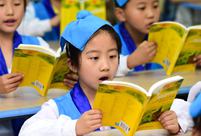

NEW YORK, June 22 -- The fresh round of the annual U.S. -China Strategic and Economic Dialogue (S&ED), which will begin in Washington D.C. on Tuesday, is expected to benefit bilateral ties from at least three perspectives, leading American experts on U.S.- China relations have told Xinhua in recent interviews.
The two-day S&ED, the seventh of its kind since 2009, will see comprehensive and in-depth exchange and discussions between high- level delegations from both sides, headed by Chinese Vice Premier Wang Yang and State Councilor Yang Jiechi, and U.S. Secretary of State John Kerry and Treasury Secretary Jacob Lew, respectively.
As usual, the two sides will explore areas of common interest and find ways to consolidate and expand their existing cooperation, the experts noted.
The S&ED is "broad-ranging" and could cover "strategic issues, key topics such as the bilateral investment treaty, as well as many technical areas," commented Dali Yang, a professor of political science with the University of Chicago, while responding to Xinhua's questions by email.
"It's essential to recognize that the United States and China, as the world's two largest economies, have significant common interests to work together on many issues in spite of some differences," added Yang, a well-known expert on China's politics and economy.
And according to Avery Goldstein, director of the Center for the Study of Contemporary China at the University of Pennsylvania, one of such issues could be climate change.
"Out of the summit (between U.S. President Barack Obama and Chinese President Xi Jinping) last year in Beijing, there was the announcement by the Americans and the Chinese on working together towards the next big international climate change conference," said the Penn professor of global politics and international relations during a phone interview with Xinhua. "I think that's an area that we can pretty much predict cooperation."
He said that he expected to see some "further progress in U.S.- China expressions of support for certain climate initiatives."
Another major topic for cooperation on the economic side might be the bilateral investment treaty between the two countries, said Goldstein.
"If that can be hammered out to the point that some announcement could be made in September, that would be another area where I think both countries would like to see progress made, " he noted, adding that "it's not gonna be easy though."
In the eyes of many political and diplomatic analysts, this coming September will witness the highlights of China-U.S. interactions for the whole year, as President Xi is paying his first state visit to America. And some U.S. experts believe this adds significance to the current round of S&ED.
"It will set the tone for the forthcoming visit by President Xi, " hopefully a positive one, said Professor Yang with the University of Chicago.
There might not be many "concrete deliverables" from the S&ED this year, noted David Dollar, a senior fellow with the John L. Thornton China Center at the Washington-based Brookings Institution. But it can "set the table for a good Xi visit, which in itself would be an important accomplishment," he was quoted as saying in a scholars' collective preview of the dialogue published on Brookings' official website.
Apart from enhancing cooperation and preparing for the presidential visit, the S&ED also offers an opportunity for the two sides to face the problems in their relations and achieve better understanding of each other's thinking and concerns, the experts believe.
The two countries could discuss and deal with "some of the most contentious topics" during the two-day high-level talks, such as the South China Sea and cyber security, said Professor Yang.
There might not be much progress on the strategic side of the dialogue, but "it's important that there will be a lot of discussion on the recent problems between the United States and China," said Professor Goldstein.
On some economic issues like the China-proposed Asian Infrastructure Investment Bank and "One Belt, One Road" initiative as well as the U.S. push for the Trans-Pacific Partnership, the two sides also need to "clarify to each other exactly what their intentions are" and it's good for them to have "some direct conversations," he added.
While concerns are mounting in the United States about China's rise and its potential challenges to the American dominance, the situation is "not necessarily alarming," observed Goldstein.
Actually, this is a moment when both countries are really trying to "more accurately understand the intentions of each other, " and they "have to learn to manage their relationship and some of the problems that it's going to generate," he said.
According to Professor Yang, it "should not be surprising" that there are "some areas of discord" in the U.S.-China relationship, "because even in families there can be conflict and disagreement."
 Students take graduation photos in ancient costumes
Students take graduation photos in ancient costumes Forbidden City collects evidence from nude photo shoot
Forbidden City collects evidence from nude photo shoot Dragon boat race held to celebrate upcoming Duanwu Festival
Dragon boat race held to celebrate upcoming Duanwu Festival  Chinese students learn Duanwu customs in Hefei, Anhui
Chinese students learn Duanwu customs in Hefei, Anhui Abandoned village swallowed by nature
Abandoned village swallowed by nature Graduation: the time to show beauty in strength
Graduation: the time to show beauty in strength School life of students in a military college
School life of students in a military college Top 16 Chinese cities with the best air quality in 2014
Top 16 Chinese cities with the best air quality in 2014 Mysterious “sky road” in Mount Dawagengzha
Mysterious “sky road” in Mount Dawagengzha Sad moment for Hong Kong democratic process
Sad moment for Hong Kong democratic process Top dogs: 12 cartoon canines that won our hearts
Top dogs: 12 cartoon canines that won our hearts Shopping up a storm
Shopping up a storm Straight through the mountains
Straight through the mountainsDay|Week